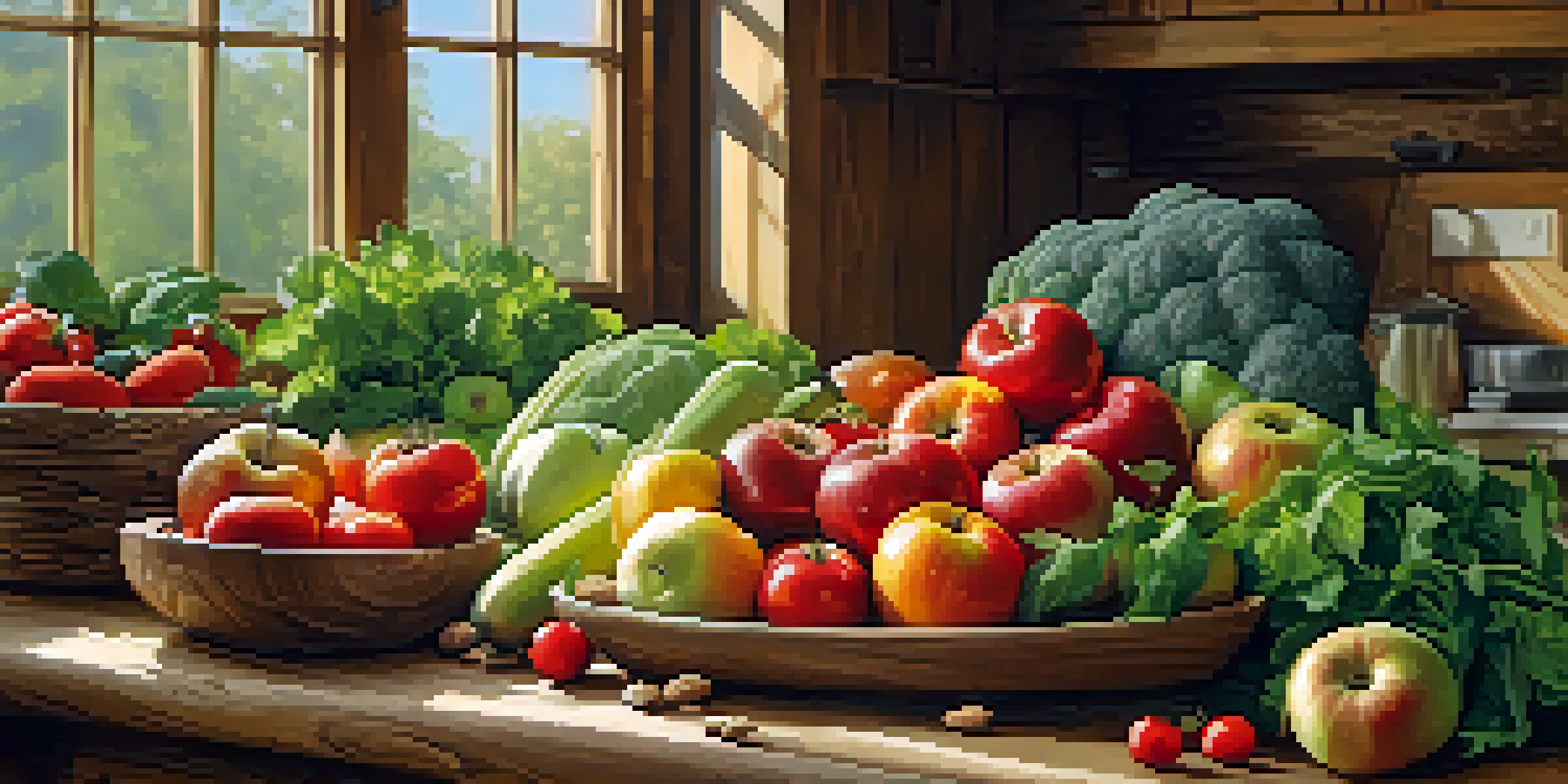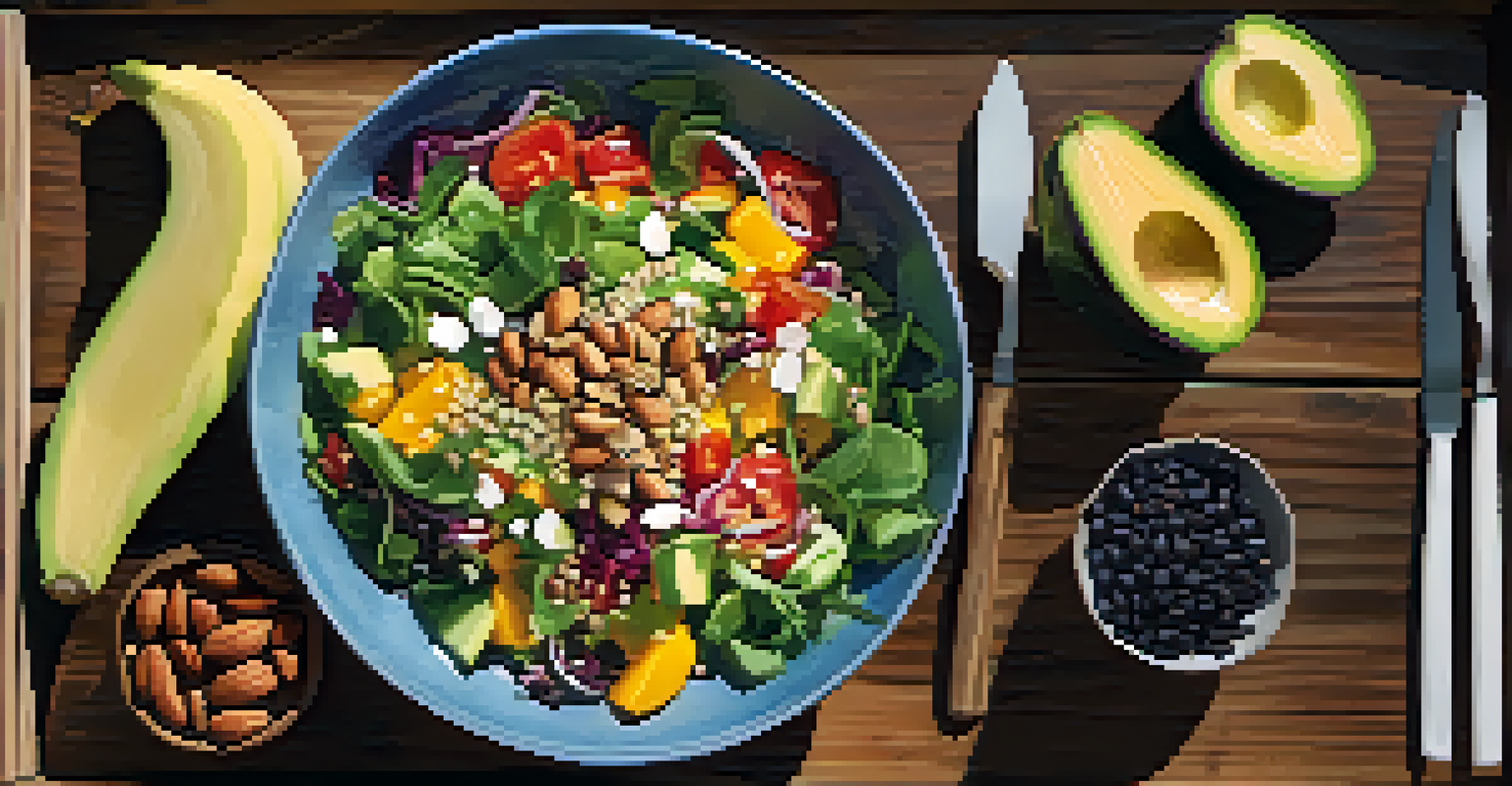Raw Food Diet: A Natural Approach to Acne Management

Understanding Acne: What Causes It?
Acne is a common skin condition that affects many people, particularly during their teenage years. It occurs when hair follicles become clogged with oil and dead skin cells, leading to inflammation and the formation of pimples. While hormonal changes are a significant trigger, diet also plays a crucial role in how our skin behaves.
Let food be thy medicine and medicine be thy food.
Many of us are familiar with the frustration of stubborn breakouts, but understanding their root causes can help us find effective solutions. Factors like diet, stress, and environmental influences can exacerbate acne. By addressing these elements, we can take proactive steps toward clearer skin.
Considering a raw food diet as a management strategy is an intriguing option. This approach emphasizes unprocessed fruits, vegetables, nuts, and seeds, providing a wealth of vitamins, minerals, and antioxidants that can support skin health.
What is the Raw Food Diet?
The raw food diet is centered around consuming uncooked and unprocessed foods. Proponents believe that heating food destroys essential nutrients and enzymes that are beneficial for our health. This diet typically includes a variety of fresh fruits, vegetables, nuts, seeds, and sprouted grains that have not been heated above 118°F (48°C).

Imagine biting into a crisp apple or a juicy tomato, bursting with flavor and nutrients—this is the essence of the raw food diet. By prioritizing whole foods, adherents aim to nourish their bodies in the most natural way possible. This diet is not just about food; it’s a lifestyle that promotes overall wellness.
Acne Causes and Management
Understanding the factors that contribute to acne, such as diet and stress, can help in finding effective management strategies.
Many individuals who adopt a raw food diet report improvements in their energy levels, digestion, and skin clarity. These benefits stem from the high intake of vitamins and antioxidants, which help combat oxidative stress and inflammation, both of which are linked to acne.
The Connection Between Diet and Skin Health
Our skin is often a reflection of our internal health, and what we eat can significantly influence its condition. Diets high in processed foods, sugars, and unhealthy fats can contribute to inflammation and hormonal imbalances, leading to acne flare-ups. Conversely, a diet rich in whole, plant-based foods may help reduce inflammation and promote skin healing.
The food you eat can either be the safest and most powerful form of medicine or the slowest form of poison.
Think of your skin as a canvas—the better the materials you use, the more vibrant the final result. By cutting out processed foods and replacing them with fresh, nutrient-dense options, you’re essentially giving your skin the best chance to thrive. Nutrients like vitamins A, C, and E, found abundantly in raw fruits and vegetables, can play a crucial role in skin repair.
Research has shown that diets lower in refined sugars and higher in fiber can lead to lower rates of acne. A raw food diet naturally aligns with this principle, making it a compelling choice for those looking to improve their skin health.
Essential Nutrients in a Raw Food Diet
A raw food diet is packed with essential nutrients that can directly benefit your skin. For instance, vitamins A and C are vital for skin repair and regeneration, while omega-3 fatty acids support anti-inflammatory processes. These nutrients can be found in abundance in raw fruits and vegetables, making them a great choice for acne management.
Consider the powerful antioxidants such as flavonoids and polyphenols, which are plentiful in raw foods. These compounds help protect the skin from damage caused by free radicals, which can contribute to premature aging and acne. By including a variety of colorful fruits and veggies in your diet, you ensure your skin receives a broad spectrum of these protective nutrients.
Benefits of Raw Food Diet
A raw food diet, rich in fruits and vegetables, provides essential nutrients that can combat inflammation and improve skin health.
Moreover, raw foods are typically high in water content, which helps keep your skin hydrated. Hydration is key to maintaining skin elasticity and clarity, making it an essential aspect of any skincare regimen.
Potential Benefits of Raw Food for Acne
Adopting a raw food diet can lead to a multitude of benefits for acne management. First and foremost, the high intake of fruits and vegetables can provide your body with the nutrients it needs to combat inflammation. This can result in fewer breakouts and a clearer complexion over time.
Additionally, many people notice improved digestion when switching to a raw food diet. A healthy gut is essential for overall health, including skin health, as it helps regulate hormones and detoxification processes. Improved digestive health can lead to fewer toxins in the body, which may translate to clearer skin.
Lastly, the emphasis on whole foods encourages mindfulness around eating habits. Paying attention to what you consume can lead to healthier choices overall, reinforcing positive lifestyle changes that benefit your skin and health in the long run.
Challenges of Following a Raw Food Diet
While the raw food diet offers many benefits, it also comes with its challenges. One of the most significant hurdles is ensuring that you get all the essential nutrients your body needs. Certain vitamins and minerals, like B12 and iron, are primarily found in animal products, making it essential to find alternative sources or consider supplementation.
Another challenge is the social aspect of eating. Dining out or attending social gatherings can be difficult when you’re sticking to raw foods, as many restaurants may not accommodate this lifestyle. This can lead to feelings of isolation or frustration if not approached thoughtfully.
Challenges of Raw Food Diet
While beneficial, following a raw food diet can present challenges, including nutrient deficiencies and social eating situations.
Lastly, some individuals may find it hard to stick to a raw food diet long-term. The initial excitement can wear off, and cravings for cooked or processed foods may arise. It’s important to find a balance that works for you, perhaps incorporating some cooked meals while still prioritizing raw foods for their many benefits.
Tips for Transitioning to a Raw Food Diet
Transitioning to a raw food diet doesn’t have to be overwhelming. Start by incorporating more raw fruits and vegetables into your meals gradually. This could be as simple as adding a side salad or having a smoothie for breakfast. By taking small steps, you can ease into this new way of eating without feeling deprived.
Experimenting with different recipes can also make the transition enjoyable. There are countless raw food recipes available online that can inspire you to create delicious meals. From raw veggie wraps to healthy desserts made from nuts and dates, the possibilities are endless!

Lastly, listen to your body during this transition. Pay attention to how you feel as you introduce more raw foods into your diet. Everyone’s journey is unique, and finding what works for you is key to maintaining a healthy relationship with food and your skin.